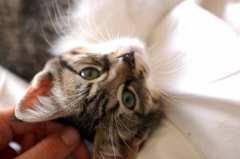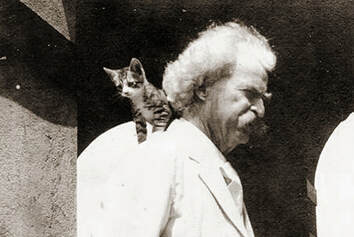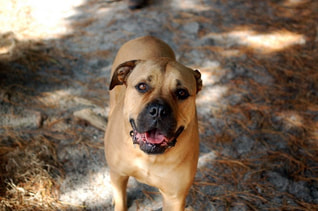|
by Ann Caputo  As a writer, I realize the obnoxious phenomenon known as “writer’s block” is part of the craft, a peril of the trade. But why does it settle in at the most inconvenient time, like when I need to begin writing nearly anything? There is nothing so daunting as the blank page and a looming deadline. It took me awhile to realize that my pets hold more power in alleviating this condition then I first believed. Like many, I have my tried-and-true antidotes to the condition. Sometimes, it’s as simple as taking deep breaths and allowing my re-oxygenated brain to come back online. Often, however, it’s more complicated, and I am forced to hoist myself out of my chair and take laps around the paper-strewn kitchen table where I struggle to create meaningful sentences. If this fails to yield results, I move on to phase two, which has me attempting the yogic downward-facing-dog in my living room—the idea being that a brain inverted will somehow think better. If all fails, I seek solace in the contents of the refrigerator. In addition to being a writer, I am an animal lover, owning a trio of cats and one gigantic, overzealous rescue dog. For a time, I looked at my pets largely as impediments to my creativity, as they seemed to need something the moment I approached my writing spot. Suddenly, the dog would realize his intense desire to be walked at that very second, or the cats would try and create a feline pyramid on my lap, all craving a scratch behind the ear. Aggravated, and as if they could understand, I would express my displeasure:  Recently, however, an old adage flitted through my brain, if you can’t beat ‘em, join ‘em. I decided to conduct a little research on relationships famous writers had with their pets and how these relationships may have benefited their writing. The first to come to mind, unsurprisingly, was Ernest Hemingway. I always knew he had a plethora of cats, but was not sure if they provided him a muse. Turns out they may have. Hemingway was once quoted as saying, “A cat has absolute emotional honesty… humans, for one reason or another may hide their feelings, but a cat does not.” This may be a bit romanticized on my part, but I like to think this infused Hemingway with a certain kind of freedom while creating his characters, and when he hit an inevitable brick wall, just noticing his self-actualized cats as they wandered by offered him the courage to mine greater emotional depths. When googling Mark Twain, another obvious subject, the very first thing that came up: Mark Twain Liked Cats Better Than People. Other articles discussed Twain’s love of felines and how this love would find its way into his prose, the most famous cat cameo occurring in The Adventures of Tom Sawyer. It was easy to draw the conclusion then, that Twain drew inspiration from his felines. As I continued to research writers having one or multiple cats that helped rather than hindered their writing, the list became lengthy, Charles Dickens, Jack Kerouac, Stephen King…but what of dogs? After all, I lovingly own both species. It turns out Virginia Woolf adored Cocker Spaniels, having several of her own, and felt significantly moved enough to pen the work, Flush: A Biography, which she dedicated to poet Elizabeth Barret Browning’s Cocker Spaniel, named, oddly enough, Flush. Kurt Vonnegut took runs on the beach with his dog, Pumpkin, to clear his head, and Gertrude Stein was passionate about white poodles, owning many throughout her lifetime, all of whom she named Basket. It was clear that I had been viewing my pets through the wrong lens when it came to my writing. In her article entitled “How Pets Impact Your Creativity,” author Caitlyn Crossley cites the fact that our pets illicit from us a childlike sense of joy and freedom, while simultaneously lowering our anxiety. What better prescription could there be for the often emotionally-addled writer? For example, as I write this current essay, my tabby cat, Luna, is basking in a sunbeam at my feet. Though not confronted with writer’s block, or its corresponding anxiety at the moment, I find her presence comforting; it feels as though she is a silent cheerleader for my prose.  Another well argued benefit of spending time with a four-legged companion is the animal’s ability to combat loneliness--and what, may I ask, is lonelier than an indifferent cursor blinking on a blank page? In her article, "Why Dogs are Good for More Than Just Snuggling," published in Real Simple magazine, writer Samantha Zabell discusses how a therapy dog named Sophie was brought to a college campus teaming with stressed out students. After petting, hugging, feeding, and playing with Sophie, 60% of the students reported a decrease in anxiety and loneliness symptoms. Of late, having a “dog therapy day” has become popular at many universities across the country, the idea being perhaps, that after frolicking with Rover on the quad, the now de-stressed college student can go off and pen that paper that has been looming over them for the better part of the semester. If, however, one is a writer without pets, can one still benefit from their blood-pressure-lowering, loneliness-squashing and creativity-expanding affects? Maybe. There are websites dedicated to those that would just like to look at pictures of animals and nothing more. For instance, photographer Jill Krement's website featuring candid photos of writers and their dogs may help some garner inspiration. Or, if one prefers cats, it may pay to visit Pinterest's writers and kitties page, which provides pictures of, well, just that. I won’t pretend that every day with my indoor menagerie will benefit my writing. There will still be times when the dog chases the cats, then the cats chase the dog in retaliation, and things get knocked over just as I am about to craft the sentence of a lifetime. But more often, I plan to tap into their comforting well of reassurance, and see if my prose responds. I now firmly believe that my pets ground my writing process. As George Eliot once said, “Animals are such agreeable friends—they ask no questions, they pass no criticisms.” And thank goodness they don’t. We do enough of that ourselves.
0 Comments
Leave a Reply. |
Archives
July 2024
Categories
All
|
|
Glassworks is a publication of Rowan University's Master of Arts in Writing 260 Victoria Street • Glassboro, New Jersey 08028 [email protected] |
All Content on this Site (c) 2024 Glassworks
|


 RSS Feed
RSS Feed
